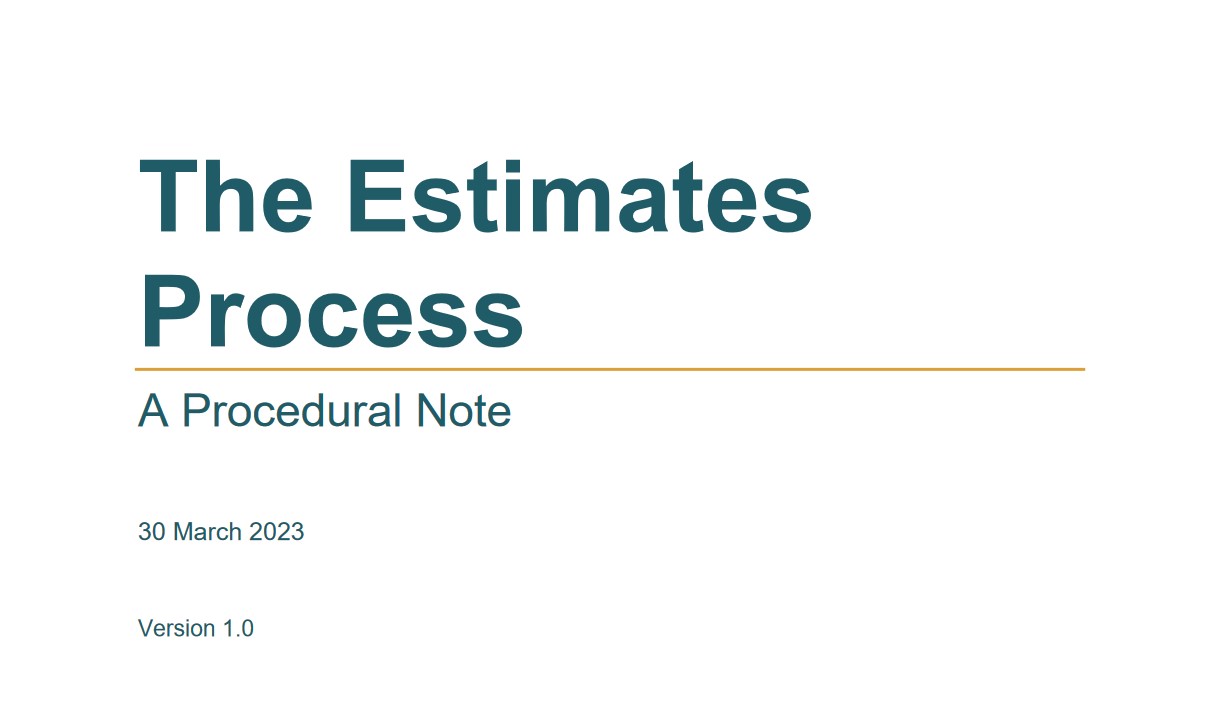Parliament has a fundamental role holding governments to account by scrutinising budgetary decisions and performance. There are four budgetary milestone engagements through the year providing for year-round scrutiny by sectoral committees.
- The Revised Estimates Volume (REV) in January/February
- The Public Service Performance Report (PSPR) in May/June
- The Mid-Year Expenditure Report in July or September
- The Supplementary Estimates in October/November
This calendar of budgetary engagements by committees was a key recommendation of the Final Report of the Committee on Budgetary Oversight on the framework for parliamentary engagement through the course of the budgetary cycle (February 2021). This report articulates a blueprint for enhanced financial and budgetary scrutiny by parliamentary committees.
Other elements of financial, pre-budget and post-budget scrutiny are undertaken by the Committee of Public Accounts (PAC) and Committee on Budgetary Oversight.
Recent scrutiny debates
Role of committees in scrutinising Estimates
- The (Abridged) Estimates | Mid October or on or before Budget day
-
Is there a role for Committees?
No.
The Abridged Estimates for Public Services comprise proposed spending for the next year and are published as part of the Expenditure Report (Budget documents). Detail provided for the Votes is limited to programme level and varies (hence "Abridged").
However, sectoral Committees may invite written submissions from members of the public, stakeholders and interested parties. They may also hold pre-Budget engagements with stakeholders on policy issues within their remit.
The Select Committee on Budgetary Oversight may also hold post-Budget engagements and make observations and recommendations related to the budgetary package and process.
- Revised Estimates | Mid December
-
Is there a role for Committees?
Yes.
The Revised Estimates Volume for Public Services, REV, provides considerably more detail at subhead level, as well as performance metrics.
Revised Estimates, or the revised "final" proposed spending for the next year, form the basis for parliamentary scrutiny of allocated expenditure.
- Further Revised Estimates | January-February
-
Is there a role for Committees?
Yes.
Further Revised Estimates are required if the original Revised Estimate is withdrawn and not passed by the Dáil, or where functions of one Department are transferred to another.
The Revised Estimates Volume for Public Services, REV, provides considerably more detail at subhead level, as well as performance metrics and form the basis for parliamentary scrutiny of allocated expenditure.
- Supplementary Estimates | Usually November
-
Is there a role for Committees?
Yes.
During the year, the Government may need to ask the Dáil for additional (or supplementary) money to the amount provided for in the approved Estimate for that year. The procedure for such a request is provided for through Supplementary Estimates. These typically arise late in the year. Dáil approval is required in the same way as for the Revised Estimates.
There are two types of Supplementary Estimates:
▪ Substantive (additional monies); and
▪ Token or technical (technical adjustments).Supplementary Estimates may also be a combination of both types.
Estimates | overview
An Estimate, also called a Vote (or voted expenditure), is the amount of money that a Government Department or agency proposes to spend in a given year. The Estimates process is Dáil Éireann's method to allow Departments to seek to withdraw funds from the Exchequer to meet the Government's spending obligations.
Estimates | process
- Presentation
-
Estimates are published just prior to Budget day as part of the Expenditure Report as part of the process of setting out the planned expenditure for next year.
These are updated and Revised Estimates are presented to the Dáil by a Minister via a motion, usually in mid December, which must be agreed by the Dáil. In some cases, Revised Estimates may be updated again as Further Revised Estimates before Dáil votes.
When the Revised Estimates process concludes, a Minister must seek leave, or permission, to introduce Additional or Supplementary Estimates via a motion. The question is then put to the Dáil for agreement. Typically, supplementaries arise later in the year.
- Referral to committee
-
Revised Estimates automatically stand referred to the relevant Select Committee, comprising Members of Dáil Éireann only, for consideration. There is no separate referral motion. Consideration begins in late January or early February.
Committees have no role in approval or amendment of Estimates referred to them.
- Committee consideration
-
Select Committees consider Estimates referred to them via a public hearing or hearings with relevant Ministers.
- Return to the Dáil and and report on committee consideration
-
Upon conclusion of the hearing, the Select Committee sends a message to the Dáil via the Clerk of the Dáil to confirm consideration is complete. This "returns" the Estimate to the Dáil.
The Committee may also report on its consideration separately in a written report with the intention to constructively provide feedback on the process.
Financial scrutiny | publications and resources
Explaining the Estimates
Take a look at an in-depth guide to how the Estimates process works in the Oireachtas.
As part of the financial scrutiny process, committees may receive submissions comprising responses to queries on the Public Service Performance Report and other matters, produce reports themselves or engage with other stakeholders.
Correspondence relating to financial scrutiny
Fri, 16 Feb 2024
Response from Department to Joint Committee on Finance, Public Expenditure And Reform, And Taoiseach | January 2024
Wed, 8 Nov 2023
Response from Department of Transport to the Joint Committee on Transport and Communications | November 2023
Tue, 17 Oct 2023
Response from Department to Joint Committee on Finance, Public Expenditure and Reform, and Taoiseach | October 2023
Committee reports
The Committee of Public Accounts and the Budgetary Oversight Committee deal specifically with budgetary matters.
Further resources
Other committees may also engage with stakeholders and produce reports related to the Budget.


